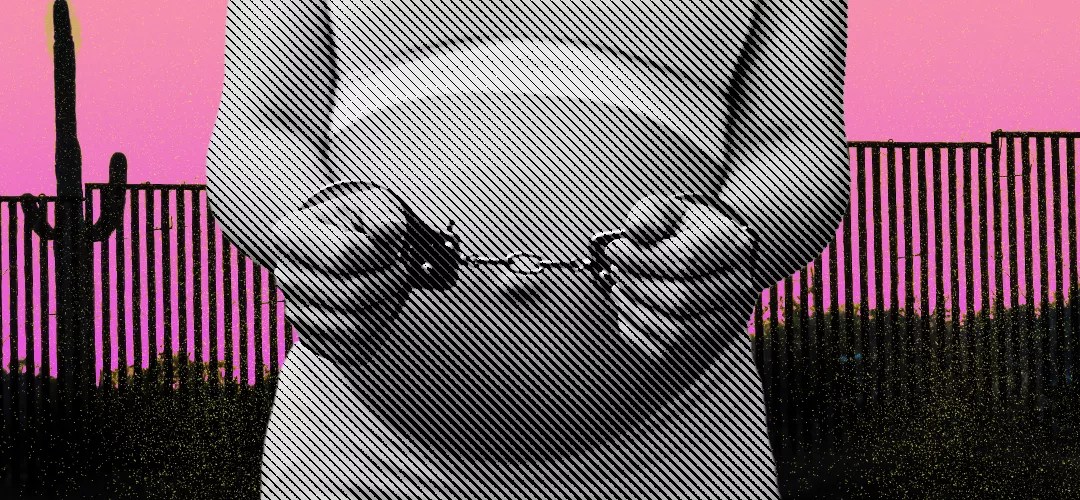
New Times Illustration (Adobe Images)

Audio By Carbonatix
Four days before Christmas in 2017, Rubia Morales-Alfaro crossed into the United States through a hole in the border wall that separates Tijuana and San Diego. She was 27 years old and filled with courage, hope, and a rather naive view of America’s immigration system. She was also several weeks pregnant.
For months, she and her partner, Miguel Hernandez, had traveled from El Salvador through Guatemala and then Mexico. Sometimes they stopped to work along the way, cleaning tables and toilets. All Morales-Alfaro possessed were the clothes on her back and a rucksack filled with a few provisions. She also had an ultrasound printout from a Tijuana clinic showing the growing fetus in her womb.
Her goal was to seek asylum in the U.S. “My idea was to surrender to immigration and to have them help me and help me do everything legally,” she later said in a deposition proceeding. The gambit was “risky,” she admitted, but what wasn’t for someone like her? “Any type of trip coming here is risky,” she said, “because we’re illegal aliens.” She was afraid, she said, but she “trusted in God.”
Trusting in God is one thing. Trusting in America’s brutal deportation regime is another. Border Patrol agents picked up Morales-Alfaro within 10 minutes of her crossing the border. What she experienced next is horrifying and tragic, and the subject of an ongoing court case.
Morales-Alfaro said Border Patrol personnel shoved and kicked her and kept her in inhumane conditions. After she was transferred to the custody of Immigration and Customs Enforcement, the medical care she needed was either delayed, inadequate or outright denied to her. Roughly three weeks after she entered the country, she collapsed and was taken to a hospital. She miscarried while chained to a stretcher.
In 2020, Morales-Alfaro sued the federal government and private prison contractor CoreCivic over her treatment. Last month, despite a mountain of legal paperwork demonstrating the harm she’d suffered, the Ninth Circuit Court of Appeals upheld a lower court’s decision to toss her claim. Morales-Alfaro could not prove that her alleged mistreatment caused her baby to miscarry, the court said. Her attorney, who is considering an appeal, worries the ruling will greenlight similar abuses of undocumented pregnant women.
The evidence of such abuses isn’t hard to find. Department of Homeland Security once barred the detention of pregnant women in most circumstances, but as DHS scrambles to fulfill Donald Trump’s mass deportation agenda, pregnant and nursing women are again in the crosshairs of masked, heavily armed immigration cops. Pregnant immigrant moms have been arrested, detained and deported.
Expectant mothers have been deported to Colombia, Venezuela and parts unknown. In April, ICE “deported the Cuban-born mother of a 1-year-old girl who was still breastfeeding, separating them indefinitely.” In May, an African woman in the third trimester of pregnancy had been detained by the Border Patrol along with her four children in a windowless cell with one toilet. That same month, the Nashville Banner reported that “a pregnant Tennessee woman” was deported to Guatemala after she had a stillbirth in custody, while a Guatemalan woman who gave birth to a baby girl at the Tucson Medical Center was saved from immediate deportation when Tucson’s activist and political class rallied to her cause.
Pregnant American citizens have not been immune. In June, ICE agents detained heavily pregnant California native Cary Lopez Alvarado, assuming she was present illegally. Just two weeks away from giving birth, Alvarado said the feds put her in “a chain from my hands under my belly that went all the way to my legs,” which is contrary to ICE’s stated protocols.
Morales-Alfaro’s ordeal occurred in the early days of the first Trump administration. Now, in Trump’s second White House stint, things have arguably gotten worse. Trump’s nativist crackdown on immigrants has sent a rotten system into overdrive, running apparently roughshod over immigration agencies’ own policies about handling expectant mothers.
For an administration and a Republican Party that often touts the concept of fetal personhood and the rights of unborn babies, it sends a clear message: In ICE custody, a pregnant woman’s rights – or those of the developing child in her womb – aren’t worth much.
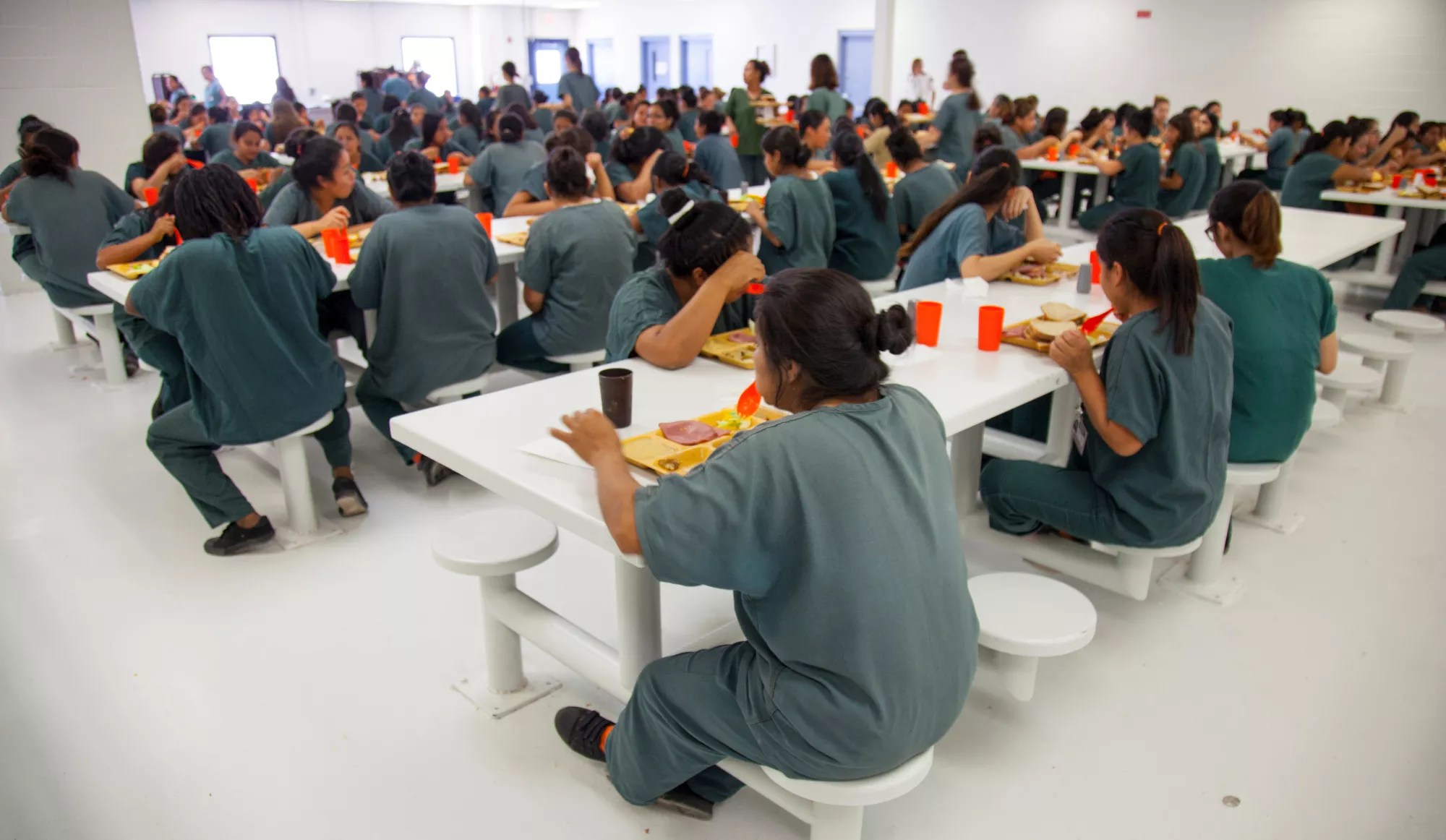
Detainees at Eloy Detention Center.
Charles Reed/Immigration and Customs Enforcement
Pregnant women on ICE
“Over and over,” according to a sworn statement Morales-Alfaro made while in ICE detention, she told the immigration agents who arrested her that she was pregnant.
Still, a female officer “kept shoving me and yelling at me to ‘walk faster,'” Morales-Alfaro said. Before being chained and hauled away, “the female officer pulled me by my hair, shoved me to the ground and kicked me in the back.” (In her deposition, Morales-Alfaro pointed to her hip when asked where she was kicked.) Morales-Alfaro repeated that she was pregnant. “That is your problem,” Morales-Alfaros said the agent replied. “Not mine.”
Morales-Alfaro said she was placed into “a very cold room” as punishment for speaking without permission. (This Border Patrol practice of using hielaras – Spanish for “freezers” – has been documented and condemned by groups like Human Rights Watch and No More Deaths.) The cold bean burrito she was given to eat upset her stomach. She complained of “pain in my abdomen” and “headaches, dizziness, and nausea.” Guards ignored her.
On Christmas Eve, three days after she entered the country and was detained, Morales-Alfaro was transferred to the Otay Mesa Detention Center, an ICE facility in San Diego run by the private prison giant CoreCivic. In court filings, CoreCivic claimed that Morales-Alfaro was treated well, given a bottom bunk to sleep on, placed on a higher-calorie “pregnancy diet,” allowed to order junk food from the commissary and permitted to roam her confines during waking hours. If she complained of health issues, she was directed to a facility clinic run by ICE Health Services Corps.
Morales-Alfaro painted a much less humane picture in her lawsuit. She said her requests for medical assistance were often ignored by CoreCivic staff and the food she received was “nearly inedible,” “nutritionally deficient” and “full of starch filler.” She and other detained pregnant women “received no fresh fruit and no fresh vegetables.” She was handcuffed or shackled when being transported to ICE custody or when going to and from the hospital.
That Morales-Alfaro was incarcerated at all was a problem. The incarceration of pregnant migrants – who are largely being held as civil detainees, not criminal ones – has been denounced by numerous medical and civil rights organizations, including the American Academy of Pediatrics, the American College of Obstetricians and Gynecologists, and the American Academy of Family Physicians. In a 2018 press release, the AAP stated that “the conditions in (DHS) facilities are not appropriate for pregnant women and children.”
It’s not hard to see why. A 2024 study published by the Journal of Perinatology noted that “incarcerated individuals have a greater likelihood of negative birth outcomes,” including higher rates of premature birth. A 2022 study in the American Journal of Public Health found that incarceration “jeopardizes maternal and fetal health,” with pregnant incarcerated women “enduring high levels of additional stressors and lower access to health care.”
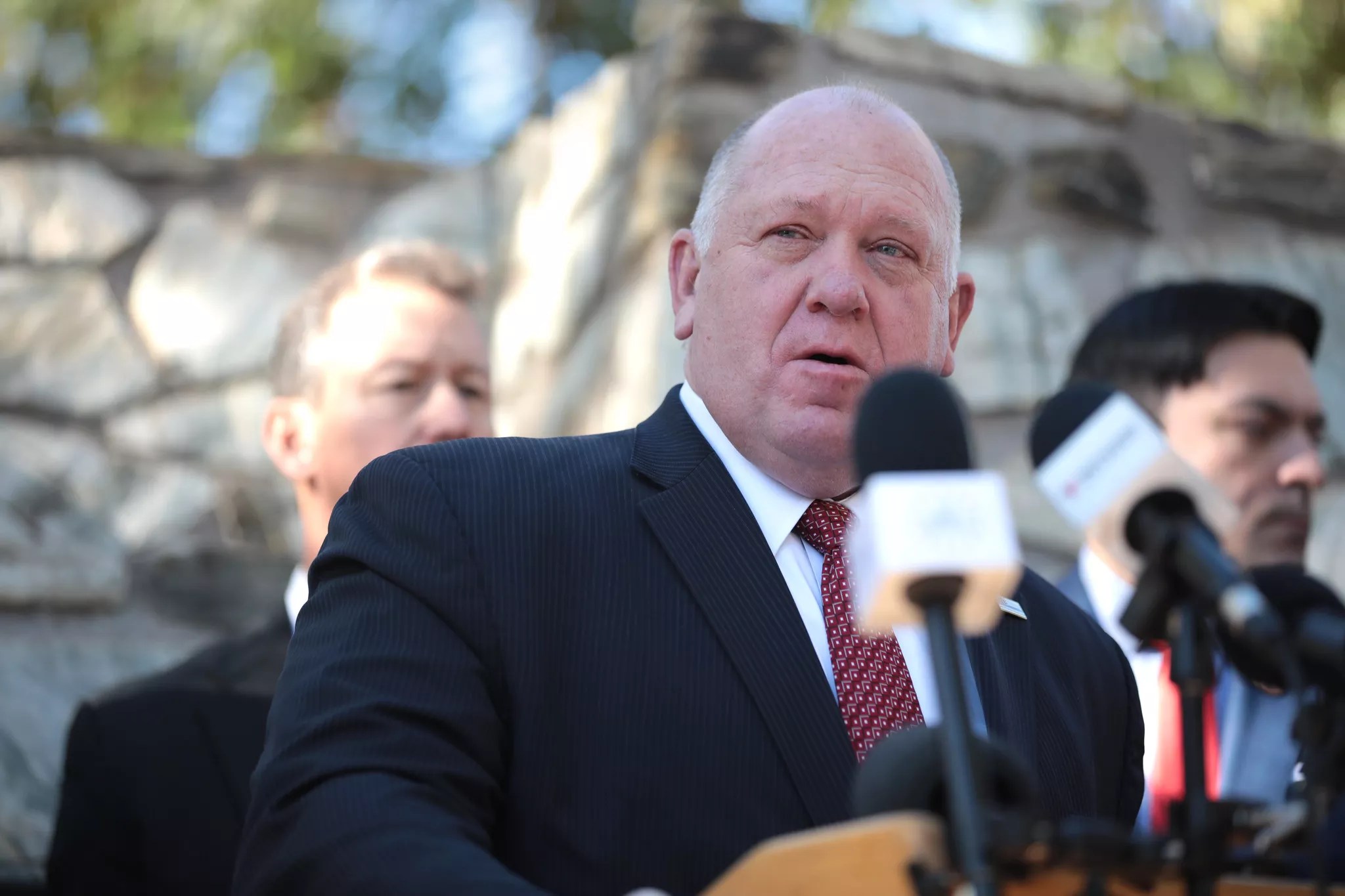
Under Donald Trump and border czar Tom Homan, the United States has flip-flopped on whether detaining and chaining pregnant immigrant women is within policy.
Gage Skidmore/Flickr/CC BY-SA 2.0
Flip-flopping
DHS once agreed that imprisoning pregnant women was a bad idea.
In 2014, under President Barack Obama, Homeland Security Secretary Jeh Johnson issued a memorandum stating that “absent extraordinary circumstances,” ICE “should not expend detention resources” on pregnant aliens or anyone else “whose detention is otherwise not in the public interest.” Reportedly, the policy extended as far back as 2011.
None other than Tom Homan, now Trump’s tough-talking “border czar,” affirmed that stance in August 2016. Then serving as the executive associate director of ICE under Obama, Homan authored a memo promising that “pregnant women will generally not be detained by ICE.” But when Trump arrived and appointed Homan as acting ICE director, Homan clicked his heels and acted accordingly. In a December 2017 memo – the same month Morales-Alfaro entered the country and ICE custody – Homan ended the presumptive release of expectant mothers.
The New York Times reported that from 2016 to 2021, ICE “arrested undocumented pregnant immigrants more than 4,000 times.” In 2019, an ICE spokesperson told the Times that between Oct. 1, 2016, and Aug. 31, 2018, 28 women “may have experienced a miscarriage just prior to, or while in ICE custody.” Tellingly, given the Trump administration’s sanctity-of-life rhetoric, the same spokesman said that “for investigative and reporting purposes, a stillbirth is not considered an in-custody death.”
In 2021, the Biden administration reversed that reversal, reinstituting the practice of generally not taking pregnant women into custody. Under Trump 2.0, has the policy on detaining pregnant women been officially re-re-reversed to the 2017 standard? Asked several times via email to answer this question, an ICE spokesperson repeatedly dodged it, instead sending Phoenix New Times the 2025 version of its National Detention Standards, which states that a pregnant woman “shall not be restrained absent truly extraordinary circumstances.” The standards say nothing about not detaining expectant mothers.
Notwithstanding ICE’s own guidelines regarding the restraint of pregnant women, Morales-Alfaro said she was shackled or cuffed more than once. In court filings, the federal government formally denied the claim. It says Morales-Alfaro would not have been shackled according to detention guidelines. Interestingly, a 2022 survey of U.S. prison practices published by the Maternal and Child Health Journal found that, despite a patchwork quilt of laws and policies against the practice, the shackling of pregnant and postpartum women persisted.
The unnecessary shackling of pregnant women, whether in civil or criminal detention, has received nearly universal condemnation. A study published last year in the Journal of Obstetric, Gynecologic and NeoNatal Nursing found that “placing a pregnant woman in shackles leads to an increased risk of falling and subsequent potential negative outcomes,” such as increased blood loss, stillbirth, and “placental abruption,” which is when the placenta prematurely separates from the inner uterine wall.
In 2018, after a Buzzfeed News exposé about miscarriages in immigration detention, Sen. Patty Murray introduced a bill to keep pregnant detainees out of handcuffs. The Washington state Democrat’s “Stop Shackling and Detaining Pregnant Women Act” would codify the presumption of release for pregnant women in immigrant detention and prohibit DHS from using physical restraints during and after pregnancy. Murray has called the act of restraining expectant mothers a “barbaric practice” with “no justifiable reason.”
Murray reintroduced the bill earlier this year. Seven years after she first pushed it, it still lacks enough support to pass.
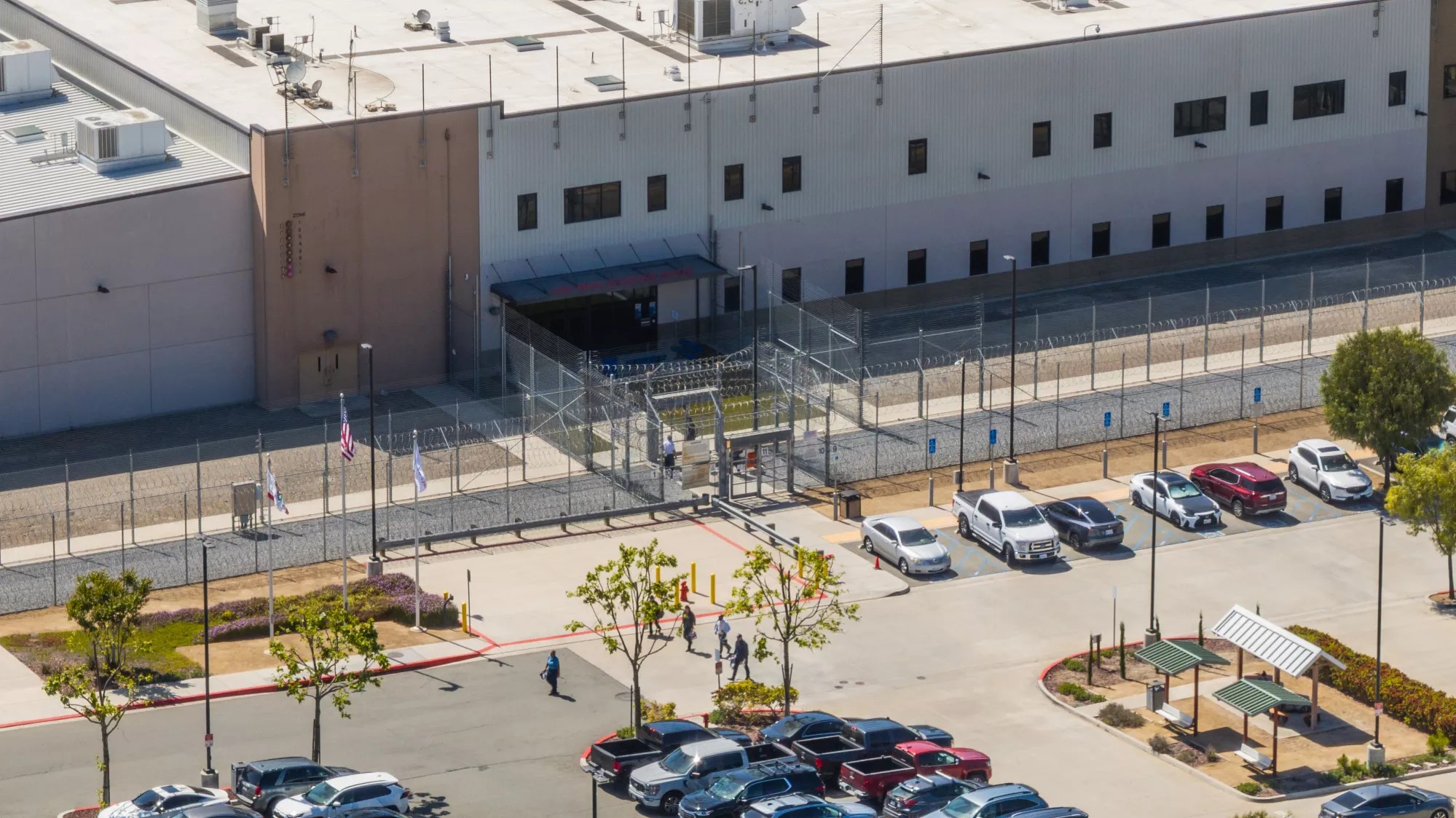
Rubia Morales-Alfaro claims she was mistreated while detained at the Otay Mesa facility run by CoreCivic, leading to her miscarriage.
JasonDoiy/Getty Images
‘Deliberatively punitive’
Several times while in ICE custody, Morales-Alfaro asked for medical attention. She knew something was wrong.
She eventually was able to see ICE nurses in CoreCivic’s facility, according to her legal complaint. During those visits, she related that she’d had a miscarriage before entering the U.S. several months earlier, had been kicked by a Border Patrol Agent after her arrest, and was experiencing abdominal pain. “Can you see if my baby is OK?” she asked one nurse. “I can’t eat and I feel sick to my stomach all the time. I think I need iron pills and vitamins.” To another nurse, Morales-Alfaro reported that she was experiencing “pain of a ‘9’ on a scale of 0 to 10.”
On Jan. 2, 2018, after nearly two weeks in detention, Morales-Alfaro reported vaginal bleeding to a nurse. She was given Tylenol and sent away. About a week later, Morales-Alfaro collapsed. She was put in chains and taken to a hospital, where her pregnancy ended. During her deposition, which was conducted in 2022, Morales-Alfaro said she asked the doctor why her baby’s heart had stopped. In his answer, the doctor noted her incarceration and “the conditions in which I had been.”
Morales-Alfaro was released in March 2018 and currently lives in Arkansas. She is still fighting to remain in the country on an asylum claim, though in Trump’s America, that’s a tough claim to make these days, one likely made tougher for Morales-Alfaro due to her pleading guilty to a forgery and minor theft charge in Arkansas in 2021, for which she received a suspended sentence and had to pay a $3,000 fine.
Another uphill battle: her fight for justice for how she was treated in ICE custody.
In 2020, Morales-Alfaro filed her lawsuit, seeking unspecified damages for the miscarriage and for the emotional trauma it wrought. She alleged that the treatment she endured was part of ICE’s policy to make the conditions for asylum seekers – especially those from Central America – “deliberately punitive.”
A government witness testified that the conditions she faced – including the use of restraints and a lack of adequate sunlight, feminine hygiene products and proper clothing – “had no effect on her pregnancy.” Despite an ultrasound to the contrary, government attorneys argued that Morales-Alfaro was never pregnant to begin with; the baby growing inside her was instead a “blighted ovum” that would eventually be absorbed back into the womb.
A federal district court judge in California ultimately ruled in favor of ICE and CoreCivic, in large part because Morales-Alfaro could not conclusively demonstrate that her miscarriage was a result of the government’s and CoreCivic’s negligence. “Even if a triable issue exists as to whether Morales-Alfaro was afforded proper care,” the judge wrote, “she fails to establish causation, an essential element of the claim.” A three-judge Court of Appeals panel upheld the lower court’s ruling in early June.
Scottsdale lawyer Joy Bertrand, who is representing Morales-Alfaro in the case, said she will ask the Ninth Circuit to reconsider its decision. Then she might seek a review of the case by a larger panel of appellate judges.
“It’s important to note that the government doesn’t deny that they failed to give her proper care,” Bertrand told New Times. (Morales-Alfaro declined an interview through the attorney.) “They simply say, ‘Who cares? It was the first trimester.’ In my reply brief on the appeal, I said if you agree with that, you’re giving them a free pass to provide no care in the first trimester.”
(Though CoreCivic has denied all of Morales-Alfaro’s accusations, including her claims of being chained upon transport, its answering brief on appeal is careful to point out that it contracts with a third party “to provide supervision and escort” outside the Otay Mesa facility. Food services there are handled by another company. And, of course, ICE provides medical services at Otay Mesa.)
No doubt nativists would opine that the fate of Morales-Alfaro’s unborn child was her own fault. If she’d just stayed put in El Salvador, all would have been well. But that stance dodges the obvious: that America is perfectly capable of ensuring that the whims of ICE staffers don’t threaten the lives of babies and mothers. In 2019 – no longer in El Salvador or in some ICE slammer, and able to adequately look after herself – Morales-Alfaro gave birth to a healthy baby girl. That daughter is a U.S. citizen by birthright, though a recent pro-Trump ruling by the Supreme Court puts that status at risk.
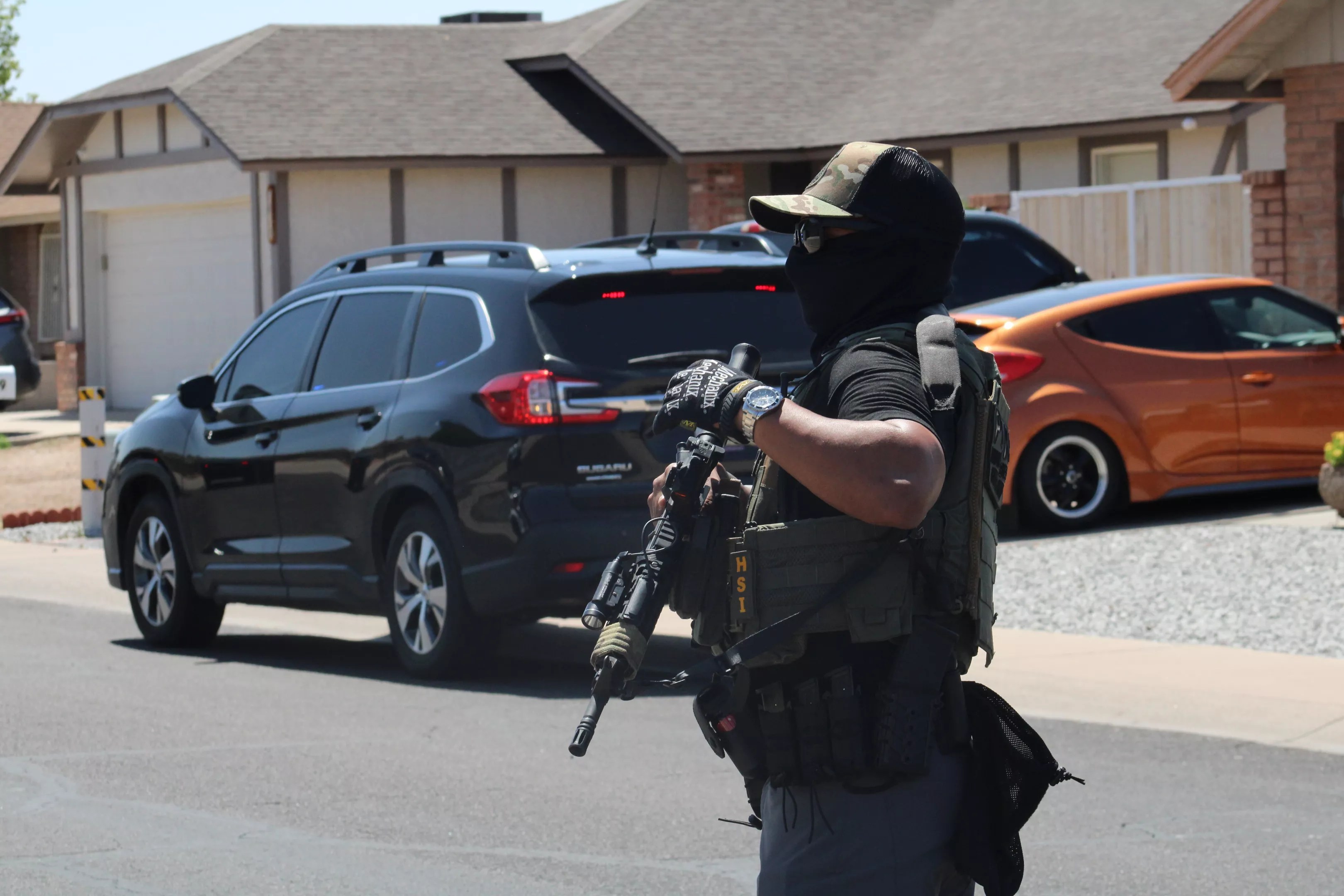
As masked, thuggish ICE agents tackle harmless street vendors, pedestrians and motorists in a frenzy to fulfill detention mandates, the number of detained people has skyrocketed.
Morgan Fischer
‘We care deeply’
Seven years after Morales-Alfaro’s harrowing experience, little has improved. Pregnant migrants continue to face rough treatment in detention centers that shouldn’t even be housing them. Monica Cordero of Arizona’s Florence Immigrant and Refugee Rights Project, a nonprofit group that provides legal services to detained migrants at ICE facilities in Florence and Eloy, said her colleagues continue to encounter pregnant detainees.
“We don’t think people should be detained generally, especially medically vulnerable people,” said Cordero, who is an adult legal program director for the organization. “And I think pregnant women fall into that sort of category.”
Cordero could not speak about the specifics of how pregnant detainees are treated, but she’s heard a litany of other complaints. Migrants have told the Florence Project about overcrowding and about people “stuck in detention longer than usual.” Migrants complain about not being able to obtain medical care and about “substandard food or not enough food to serve the population.”
In an email, CoreCivic public affairs manager Brian Todd did not directly address the overcrowding allegations or a question about how many pregnant women are currently housed in the company’s immigration detention centers. Todd said staff at the Central Arizona Florence Detention Complex “offer comprehensive care to pregnant detainees” and that all facilities “provide three nutritious meals a day,” including “more than a dozen therapeutic diets.”
“We care deeply about treating people in our facilities humanely and providing them with a safe, clean and dignified environment,” Todd said.
However, the Hilton CoreCivic ain’t. And anyone who thinks houses of detention can in any way be “dignified” should read up on the Stanford Prison Experiment, particularly as ever more ordinary people end up behind CoreCivic’s walls, sometimes just because they showed up to their appointed date at immigration court.
As masked, thuggish ICE agents tackle harmless street vendors, pedestrians and motorists in a frenzy to fulfill detention mandates, the number of detained people has skyrocketed. Syracuse University’s Transactional Records Access Clearinghouse recently reported that, as of June 1, ICE was detaining 51,302 people, “the first time that the total number of detainees has surpassed 50,000 since September 2019.” Sixty-five percent of those detained by ICE in Fiscal Year 2025 so far have had no criminal convictions, according to the libertarian CATO Institute, and 93% have had no violent convictions.
They’re just plain ol’ immigrant moms, dads, college kids – and, you guessed it, pregnant women and nursing mothers.
In 2022, four years after her miscarriage and release from ICE custody, Morales-Alfaro remained haunted by the experience. “I always have nightmares,” she said in her deposition. “I’m always remembering that, and I cannot get over it. My life changed a lot because I never expected that. I was just expecting help, but that didn’t happen.”
Morales-Alfaro went into ICE custody with an unborn kid in her belly. When she emerged, the baby was no more. She wasn’t the first migrant woman to lose a pregnancy while in – and arguably because of – ICE detention. Many others have suffered the same tragedy. As long as the U.S. decides it needs to lock and chain up vulnerable pregnant women, more preventable miscarriages are likely to occur.
At least for migrants, protection of the “unborn” by a putatively pro-life Republican regime is, apparently, non-existent.
This story is part of the Arizona Watchdog Project, a yearlong reporting effort led by New Times and supported by the Trace Foundation, in partnership with Deep South Today.